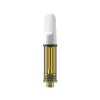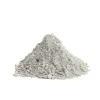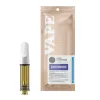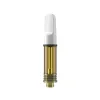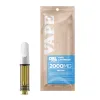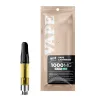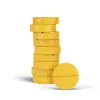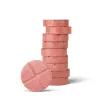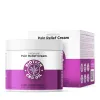If you’ve ever experimented with different cannabis ingestion methods—whether you like delta 8, delta 9, or delta 10—you already know that despite vaping, smoking, or eating the same compound in the same dosages, one ingestion method feels much, much stronger than all others: THC edibles.
It’s a tale as old as edibles themselves: you’ve smoked a joint or ripped a bong many times before, so you choose to try some edibles. After all, you already know you can handle the potency of the cannabinoid you’re smoking. So, you make pot brownies or buy some gummies and pop one or two. Two hours go by, and nothing happens, and then, all of a sudden, those seemingly harmless little treats hit you like a ton of bricks and you’re left reminding yourself how to blink and kind of craving a baby enrichment YouTube video.
But why does this happen? In simple terms, the answer is 11-hydroxy-THC. Join us as we explore the compound’s nature, how it occurs, and its effects on our bodies!
The Real Reason Edibles Feel Much Stronger
When you smoke or vape marijuana, THC is absorbed into your bloodstream through your lungs, where it travels to your brain and gets you high within minutes, and that’s the end of that. What happens when you eat edibles, however, is best described by comedian Joe Rogan, according to whom, “When you eat [cannabis], it’s processed by your liver, and it produces something called 11-hydroxy metabolite that’s five times more psychoactive than THC… and it lets you talk to dolphins!”
While the comedian isn't right about everything—as much as his fanbase would like to disagree—he was certainly right about 11-hydroxy-THC. Now, we’ve personally never had a heart-to-heart with any aquatic mammal, but hey, we also don’t make enough to afford the “swimming with dolphins” package when we travel!
Essentially, eating the same amount of THC as you smoke will make you much higher for much longer—sometimes upwards of eight hours. This is all due to 11-hydroxy-THC, also known as 11-OH-THC, a metabolite that becomes the third form of a cannabinoid found in raw cannabis. It first starts as THCA, or tetrahydrocannabinolic acid, and is then converted into THC after aging and heating. Once you pop that bear or infuse a meal with cannabutter, it is metabolized by the liver and turned into 11-hydroxy-THC, which later converts into 11-nor-9-carboxy-THC.
We know, we know, it’s a lot of numbers and dashes. This isn't high school algebra, right? To put it simply, when you eat an edible, it must bypass the digestive system, get broken down, and the THC must get converted into 11-hydroxy-THC in the liver. From there, the metabolite makes its way into your bloodstream, where it travels to your brain and gets you higher than a… uh, what were we talking about again?
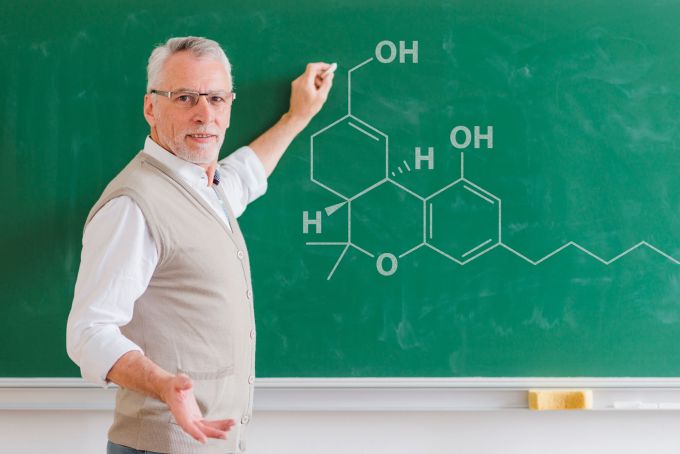
The Difference Between THC Smoked vs Eaten
11-hydroxy-THC isn't exclusive to edibles. Some research suggests that the compound can be formed after inhaling THC, such as when you vape or smoke. That said, levels of 11-hydroxy-THC are much higher when THC is eaten compared to inhaled. So, basically, the more 11-hydroxy-THC your body makes, the higher you get.
There are some other differences between eaten and smoking THC, such as the amount of time its effects take to kick in, how long they last, and how potent they feel.
|
Method of THC Ingestion |
Inhaling THC |
Eating THC |
|---|---|---|
|
Start of Effects |
Within seconds to minutes of inhalation. |
Within 30 minutes to 2 hours of ingestion. |
|
Peak Effects |
Within 30 minutes. |
Within 4 hours. |
|
Duration of Effects |
Can last up to 3 hours. |
Can last up to 10 hours. |
|
Potency |
Strong |
Lights out, baby! |
Did You Know Delta 9 & Delta 8 Gummies Both Turn Into 11-Hydroxy-THC?
We’ve already established that delta 9 (THC) is converted into 11-hydroxy-THC when ingested in edible form, but the compound isn't the only tetrahydrocannabinol to get stronger once it enters the liver. In fact, like delta 9, delta 8 turns into 11-hydroxy-THC when digested and metabolized by the liver as well. This results in heightened psychoactive effects and a longer effect duration; that said, because the compound needs to bypass the digestive system before it can kick in, it could be a little while before you feel these heightened properties.
Remember, your delta 8 edibles will hit, and they’ll hit hard. So, be sure to wait a couple hours before you decide to up your dosage—nobody wants you lethargic on the couch because you weren’t patient enough to wait for your first round of delta 8 gummies to kick in!
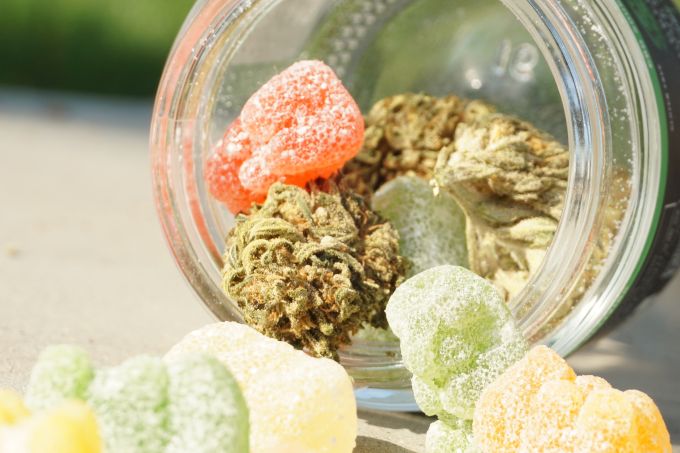
How Do THC Edibles Turn Into 11-Hydroxy-THC?
We’ve already explained how THC edibles turn into 11-hydroxy-THC in simple terms, but it’s time to dive a little deeper into the details. Whether in the form of delta 9 or delta 8, THC travels through the digestive tract and stomach and into your liver, where it’s metabolized and converted into molecules called metabolites. Several metabolic enzymes play a role in a process known as first-pass metabolism, through which THC is broken down into 11-Hydroxy-THC.
According to Dr. Adie Rae and scientific adviser to Weedmaps, “The liver is responsible for this transformation, and specifically, the drug-metabolizing enzyme known as cytochrome P2C9 or CYP2C9. Even when you smoke, your liver still sees some delta 9 and turns it into 11-hydroxy-THC, but you get way more 11-OH when you eat cannabis.”
The metabolite has a higher binding affinity for the CB1 receptor, which physically binds more tightly to the receptor than delta 9. Essentially, the better it binds, the better it activates the receptor, and the better it activates the receptor, the higher you get. To learn more about cannabinoid receptors, check out our article on the Endocannabinoid System.
So, in essence, 11-hydroxy-THC isn't an active ingredient in your edibles, but rather a chemical reaction that happens inside your body, getting you higher than you even paid for! Talk about your body having your back.
How Does the Body Absorb 11-Hydroxy-THC?
According to a study published to the Permanente Journal in 2021, “After oral consumption, THC travels to the liver where most of it is eliminated or metabolized. THC is metabolized into other molecules by CYP2C and CYP3A in the liver. These enzymes turn THC into 11-OH-THC, which is also psychoactive, and then into 11-COOH-THC, which is not psychoactive.”
Once THC is present in the body, it is absorbed from the liver into the bloodstream, where it then makes its way into the brain and begins to cause its psychoactive and physiological effects.
Metabolic Pathways Explained
It’s important to understand exactly what does on in your body when it comes to consuming cannabis, whether in the form of edibles or smokables. When we use cannabis, compounds like cannabinoids are released into our body, and where they’re processed in the body has a huge impact on the type of effects these compounds have.
This is referred to as the metabolic process and it occurs for all compounds that enter our body, not just for cannabis. You likely already know about metabolism and how this system is responsible for converting food to energy. The rate at which cannabinoids are processed and absorbed by the body after ingestion is highly dependent on many factors that are unique to an individual. These include:
- Metabolism
- Weight
- Gender
- Eating habits
Genes are also thought to play an important role here. A study published in the National Library of Medicine found that variations in CB1 and CB2 receptors, as well as CYP enzymes in the liver, may not be as proficient at interacting with cannabinoids as other mutations are. This theory explains why some cannabis users need such high doses to feel any effects at all, while others can take one gummy and feel buzzed for hours.

Published Research Involving 11-Hydroxy-THC
While limited, the available research on 11-hydroxy-THC demonstrates the metabolite’s gargantuan potency. One study published in the Journal of Clinical Investigation in 2020 found that 11-hydroxy-THC is “much more potent at producing a subjective high and racing heart than delta-9.”
Another study, published in the journal Progress in Neuropsychopharmacology & Biological Psychiatry “examined the impact of age, sex, and rodent species on the effects of intraperitoneal delta-9-tetrahydrocannabinol and its primary psychoactive metabolite, 11-OH-THC, in rodent models of psychoactivity,” and found 11-hydroxy-THC’s potency to be somewhere between 1.5 and 7 times stronger than delta 9 in certain animals.
The Powerful Effects of 11-Hydroxy-THC
11-hydroxy-THC isn't a cannabinoid found in any hemp or marijuana plants—it’s not even an ingredient in your cannabinoid products, edible or otherwise. It occurs when your body metabolizes THC in the liver. The result of this conversion is an added sense of potency.
Although taking edibles requires some patience as your brownie or gummy bypasses your digestive system, enters the bloodstream, and reaches the brain, the wait is certainly worth it. The conversion from THC into 11-hydroxy-THC makes the compound much stronger and longer-lasting. This means that you’ll get way higher for a longer amount of time when eating edibles that you would from smoking a J or hitting your vape.
Your Brain On Edible Marijuana
In Summary - Yes, Edibles Are Stronger Than Smoking
So, why do edibles feel so much stronger than smoking cannabis? Because they are, and it’s all due to 11-hydroxy-THC. 11-hydroxy-THC has been found to happen when inhaling cannabis as well, but the amount that is produced is much larger when ingesting edibles. This means that the liver creates more 11-hydroxy-THC from edibles than it does from vaping or smoking. Because 11-hydroxy-THC is more efficient at binding with cannabinoid receptors, it is also much more potent and creates longer-lasting effects.
And there you have it, the full and unofficial Bill Nye the Science Guy explanation for why edibles feel—and are—so much stronger than smokables. Remember, the potency of edibles can be fun, but be sure to pace yourself and give your body a little time to get the party started before downing a whole jar of gummies. Now, get munchin’ and happy buzzing!


